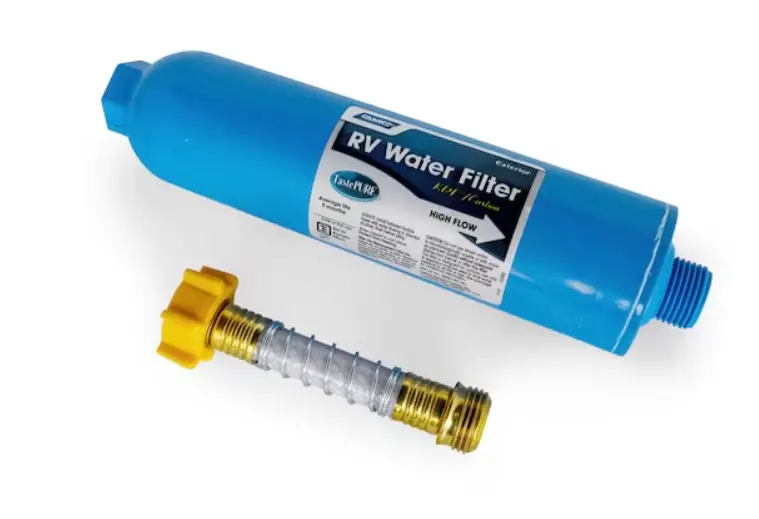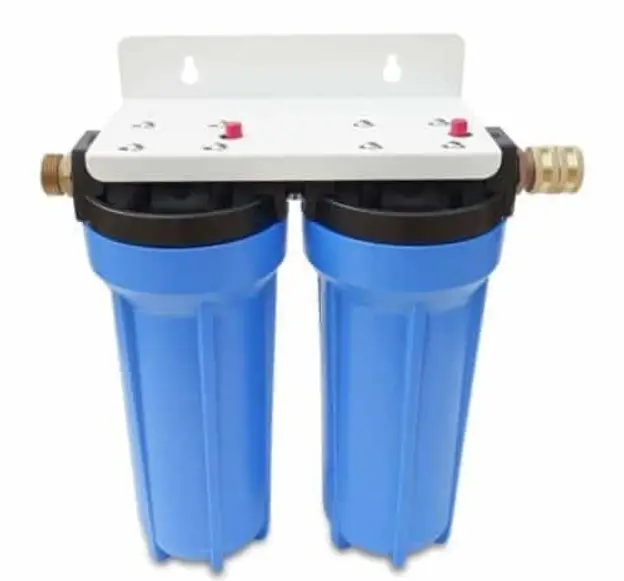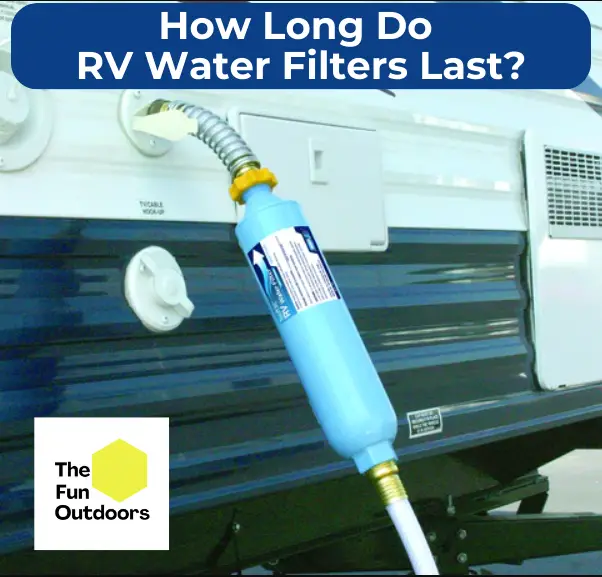If you’re an RV owner, you know how important it is to have clean and safe drinking water on board. That’s why RV water filters are a crucial component of your water system. But how long do RV water filters last? The answer is typically between 4 to 6 months, depending on the type of filter and your usage.
To ensure that your RV water filter lasts as long as possible, it’s important to maintain it properly. This includes regularly replacing the filter and cleaning the filter housing. Choosing the right RV water filter for your needs is also crucial. We’ll go over everything you need to know in this guide.
Quick Facts
- RV water filters typically last between 4 to 6 months.
- Understanding the type of filter and your usage can affect the lifespan of your RV water filter.
- Proper maintenance and choosing the right filter can help extend the lifespan of your RV water filter.
| RV Water Filter Type | Lifespan |
| Carbon Filters | 4-6 months |
| Ceramic Filters | 6-12 months |
| Reverse Osmosis Filters | 2-3 years |
Understanding RV Water Filters
RV water filters are essential for ensuring that you have clean and safe drinking water while on the road. In this section, we will discuss how RV water filters work and the different types of filters available.
How RV Water Filters Work
RV water filters work by removing impurities from the water supply. They do this by using a variety of filtration methods, such as carbon filtration, ceramic filtration, and reverse osmosis.
Carbon filters are the most common type of RV water filter. They work by using activated carbon to absorb impurities and improve the taste and odor of the water. Ceramic filters are another popular option. They use a ceramic material to filter out bacteria and other contaminants.
Reverse osmosis filters are the most effective at removing impurities from the water supply. They use a semi-permeable membrane to remove contaminants and produce clean, safe drinking water.
Types of RV Water Filters
There are several types of RV water filters available, each with its own advantages and disadvantages. Here are some of the most common types:
- Inline water filters: These filters are installed directly onto the water hose and are easy to use. They are typically made of carbon and are effective at removing sediment and chlorine from the water supply.
- Canister filters: These filters are installed under the sink and are more effective at removing impurities than inline filters. They are available in a variety of sizes and can be customized to meet your specific needs.
- UV water filters: These filters use ultraviolet light to kill bacteria and other microorganisms in the water supply. They are effective at removing impurities but can be expensive.
- Carbon water filters: These filters use activated carbon to remove impurities from the water supply. They are easy to install and are effective at improving the taste and odor of the water.
In conclusion, understanding RV water filters is essential for ensuring that you have clean and safe drinking water while on the road. There are several types of filters available, each with its own advantages and disadvantages. By choosing the right filter for your needs, you can ensure that you always have access to clean, safe drinking water.
How Long Do RV Water Filters Last?

One of the most important things to consider when using an RV water filter is its lifespan. Knowing how long your filter will last can help you plan when to replace it and ensure that your water is always clean and safe to use.
Most RV water filters last for about 4 to 6 months, depending on the type of filter and the quality of your water source. The lifespan of your filter can also be affected by how frequently you use it and how much water you filter.
It’s important to note that the lifespan of your filter can be shortened if you’re using it to filter water that is particularly dirty or contaminated. If you’re using your RV in an area with poor water quality, you may need to replace your filter more frequently to ensure that your water is safe to use.
To get the most out of your RV water filter, it’s important to follow the manufacturer’s recommendations for use and maintenance. This may include regularly cleaning your filter and replacing it at the recommended intervals.
Overall, the lifespan of your RV water filter will depend on a variety of factors, including the type of filter you’re using, the quality of your water source, and how frequently you use it. By understanding these factors and taking proper care of your filter, you can ensure that your water is always clean, safe, and refreshing.
Factors Affecting Filter Lifespan

When it comes to the lifespan of your RV water filter, there are several factors that can affect how long it lasts. Understanding these factors can help you get the most out of your filter and ensure that your water stays clean and safe to drink.
Water Quality
One of the biggest factors that can affect the lifespan of your RV water filter is the quality of the water you are filtering. If you are using water that is heavily contaminated or has a lot of sediment, your filter will have to work harder to remove impurities, which can cause it to wear out more quickly. In general, the better the quality of your water, the longer your filter will last.
Frequency of Use
Another factor that can affect the lifespan of your RV water filter is how often you use it. If you are using your filter every day, it will wear out more quickly than if you only use it occasionally. Additionally, if you are using your filter for extended periods of time, such as on a long camping trip, it may wear out more quickly than if you only use it for short periods of time.
Type of Filter
The type of filter you are using can also affect how long it lasts. There are several different types of RV water filters available, including carbon filters, ceramic filters, and reverse osmosis filters. Each type of filter has its own strengths and weaknesses, and some may last longer than others depending on your specific needs and usage.
Keep in mind that these are general guidelines, and the lifespan of your filter may vary depending on the specific brand and model you are using, as well as your water quality and usage.
Maintaining Your RV Water Filter
Maintaining your RV water filter is crucial to ensure that you have clean and safe drinking water during your trips. The lifespan of an RV water filter can vary depending on the type of filter, water quality, and frequency of use. However, most RV water filters last between 4 to 6 months before needing replacement.
To maintain your RV water filter, you should follow these simple steps:
- Check for leaks: Before using your RV water filter, make sure to check for any leaks in the water system. Leaks can cause damage to your filter and reduce its lifespan.
- Replace when necessary: Replace your RV water filter every 4 to 6 months or as recommended by the manufacturer. Using an expired filter can lead to contaminated water and health risks.
- Clean the filter housing: Clean the filter housing regularly to remove any dirt or debris that may have accumulated. This will help prolong the life of your filter and ensure clean water.
- Use clean water: Use clean water to flush out your RV water filter before and after each trip. This will help remove any sediment or debris that may have accumulated and ensure that your filter is working properly.
By following these simple steps, you can ensure that your RV water filter is working effectively and providing you with clean and safe drinking water during your trips.
Choosing the Right RV Water Filter
When it comes to choosing the right RV water filter, there are a few things you need to consider. In this section, we’ll go over some of the most important factors to keep in mind.
Destination Considerations
One of the most important things to consider when choosing an RV water filter is where you’ll be traveling. Different destinations may have different water quality, which can affect the type of filter you need.
For example, if you’re traveling to an area with a lot of sediment in the water, you may need a filter that specifically targets sediment.
Flow Rate and Water Pressure
Another important factor to consider is the flow rate and water pressure of your RV. Some filters may reduce the flow rate of your water, which can be frustrating if you’re trying to take a shower or wash dishes. Make sure to choose a filter that won’t significantly reduce your water pressure.
Types of Filters
There are a few different types of filters you can choose from when it comes to RV water filters. Here are some of the most common:
- Inline filters: These filters attach to your RV water hose and filter the water as it enters your RV.
- Sediment filters: These filters specifically target sediment in the water.
- Carbon filters: These filters are designed to remove odors and improve taste.
- Whole-house filters: These filters are installed in your RV’s plumbing system and filter all of the water that enters your RV.
Other Considerations
In addition to the factors listed above, there are a few other things to keep in mind when choosing an RV water filter:
- Make sure the filter is compatible with your RV water hose.
- Check the filter’s lifespan to make sure it will last for the duration of your trip.
- Consider the cost of replacement filters when choosing a filter.
By considering all of these factors, you can choose the right RV water filter for your needs and ensure that you have clean, potable water no matter where you travel.
Additional RV Water System Components
When it comes to your RV’s water system, there are a few additional components that you may want to consider in addition to your water filter. These components can help to ensure that your water supply is clean, safe, and free from any unwanted contaminants.
Freshwater Hose
Your freshwater hose is an important component of your RV’s water system, as it is responsible for delivering water from your source to your RV.
When selecting a freshwater hose, it is important to choose one that is designed specifically for use with RVs. These hoses are typically made from materials that are safe for drinking water, and are designed to resist kinking and twisting.
Cartridge Filter
In addition to your RV water filter, you may also want to consider using a cartridge filter. These filters are designed to remove sediment and other larger particles from your water supply, which can help to extend the life of your water filter and improve the overall quality of your water.
Activated Carbon Filter
An activated carbon filter is another option that you may want to consider for your RV’s water system. These filters are designed to remove chlorine, bad tastes, and odors from your water supply, which can help to improve the overall taste and quality of your water.
Overall, incorporating these additional components into your RV’s water system can help to ensure that your water supply is clean, safe, and free from any unwanted contaminants.


